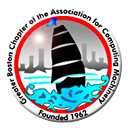Beyond Neutrality - enabling a world of connected things
IEEE Computer and Communications Societies and GBC/ACM
7:00 PM, Thursday, 16 October 2014
MIT Room E51-315
Beyond Neutrality - enabling a world of connected things
Bob Frankston
Network Neutrality and related policy issues are framed by the assumption that intelligence is inside a network and (tele)communications is a service. Today that intelligence is now in our devices which can communicate by exchanging packets using any means available. This shift in intelligence has also moved value creation outside of networks.
In this talk I'll trace the history of this fundamental transformation and the technical and policy implications and what it means to "communicate". This shift has opened up new opportunities for how to cooperate in creating a 21st century infrastructure. By paying for the infrastructure as a common facility we will not be limited to messages that profit intermediaries be they telecom providers or chip makers.
The IEEE itself is at a crossroads as the organization faces a fundamental shift from a world of hardware (electrons) to one in which value and devices are created using software (bits).
For more background read http://rmf.vc/IEEENotTheMessage or the longer essay http://rmf.vc/ConnectivityPolicy.
Bob Frankston is perhaps best known as the co-creator with Dan Bricklin of VisiCalc (the first spreadsheet program) and the co-founder of Software Arts, the company that developed it, for which he was recognized with the ACM Software System Award and the MIT LCS Industrial Achievement Award and named a fellow by the ACM, the IEEE and the Computer History Museum. He's a graduate of Stuyvesant High School and MIT, where he co-founded the Student Information Processing Board and worked on project MAC, worked at Lotus and Microsoft for a while, and is now an angel investor and a Distinguished Lecturer for the IEEE Consumer Electronics Society. In recent years, Frankston has been an outspoken advocate of ambient connectivity and for reducing the role of telecommunications companies in the evolution of the internet, particularly with respect to broadband and mobile communications. He coined the term "Regulatorium" to describe what he considers collusion between telecommunication companies and their regulators that prevents change.
This joint meeting of the Boston Chapter of the IEEE Computer and Communications Societies and GBC/ACM will be held in MIT Room E51-315. E51 is the Tang Center on the corner of Wadsworth and Amherst Sts and Memorial Dr.; it's mostly used by the Sloan School. You can see it on this map of the MIT campus. Room 315 is on the 3rd floor.
